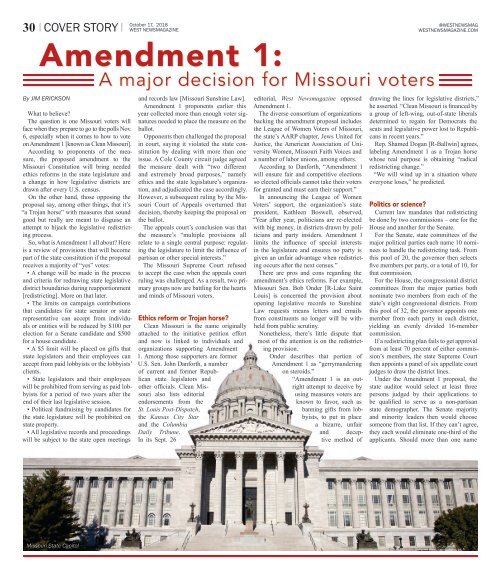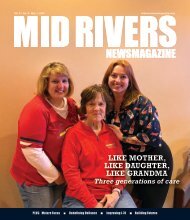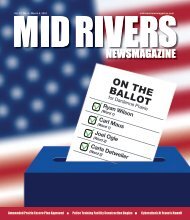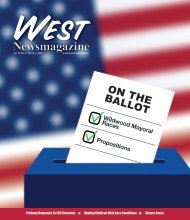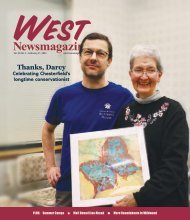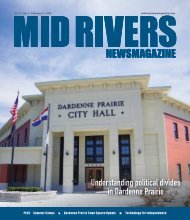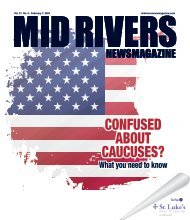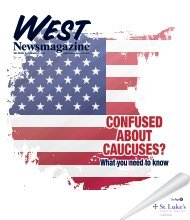West Newsmagazine 10-17-18
Local news, local politics and community events for West St. Louis County Missouri.
Local news, local politics and community events for West St. Louis County Missouri.
Create successful ePaper yourself
Turn your PDF publications into a flip-book with our unique Google optimized e-Paper software.
30 I COVER STORY I<br />
October <strong>17</strong>, 20<strong>18</strong><br />
WEST NEWSMAGAZINE<br />
@WESTNEWSMAG<br />
WESTNEWSMAGAZINE.COM<br />
Amendment 1:<br />
By JIM ERICKSON<br />
What to believe?<br />
The question is one Missouri voters will<br />
face when they prepare to go to the polls Nov.<br />
6, especially when it comes to how to vote<br />
on Amendment 1 [known as Clean Missouri].<br />
According to proponents of the measure,<br />
the proposed amendment to the<br />
Missouri Constitution will bring needed<br />
ethics reforms in the state legislature and<br />
a change in how legislative districts are<br />
drawn after every U.S. census.<br />
On the other hand, those opposing the<br />
proposal say, among other things, that it’s<br />
“a Trojan horse” with measures that sound<br />
good but really are meant to disguise an<br />
attempt to hijack the legislative redistricting<br />
process.<br />
So, what is Amendment 1 all about? Here<br />
is a review of provisions that will become<br />
part of the state constitution if the proposal<br />
receives a majority of “yes” votes:<br />
• A change will be made in the process<br />
and criteria for redrawing state legislative<br />
district boundaries during reapportionment<br />
[redistricting]. More on that later.<br />
• The limits on campaign contributions<br />
that candidates for state senator or state<br />
representative can accept from individuals<br />
or entities will be reduced by $<strong>10</strong>0 per<br />
election for a Senate candidate and $500<br />
for a house candidate.<br />
• A $5 limit will be placed on gifts that<br />
state legislators and their employees can<br />
accept from paid lobbyists or the lobbyists’<br />
clients.<br />
• State legislators and their employees<br />
will be prohibited from serving as paid lobbyists<br />
for a period of two years after the<br />
end of their last legislative session.<br />
• Political fundraising by candidates for<br />
the state legislature will be prohibited on<br />
state property.<br />
• All legislative records and proceedings<br />
will be subject to the state open meetings<br />
A major decision for Missouri voters<br />
and records law [Missouri Sunshine Law].<br />
Amendment 1 proponents earlier this<br />
year collected more than enough voter signatures<br />
needed to place the measure on the<br />
ballot.<br />
Opponents then challenged the proposal<br />
in court, saying it violated the state constitution<br />
by dealing with more than one<br />
issue. A Cole County circuit judge agreed<br />
the measure dealt with “two different<br />
and extremely broad purposes,” namely<br />
ethics and the state legislature’s organization,<br />
and adjudicated the case accordingly.<br />
However, a subsequent ruling by the Missouri<br />
Court of Appeals overturned that<br />
decision, thereby keeping the proposal on<br />
the ballot.<br />
The appeals court’s conclusion was that<br />
the measure’s “multiple provisions all<br />
relate to a single central purpose: regulating<br />
the legislature to limit the influence of<br />
partisan or other special interests.”<br />
The Missouri Supreme Court refused<br />
to accept the case when the appeals court<br />
ruling was challenged. As a result, two primary<br />
groups now are battling for the hearts<br />
and minds of Missouri voters.<br />
Ethics reform or Trojan horse?<br />
Clean Missouri is the name originally<br />
attached to the initiative petition effort<br />
and now is linked to individuals and<br />
organizations supporting Amendment<br />
1. Among those supporters are former<br />
U.S. Sen. John Danforth, a number<br />
of current and former Republican<br />
state legislators and<br />
other officials. Clean Missouri<br />
also lists editorial<br />
endorsements from the<br />
St. Louis Post-Dispatch,<br />
the Kansas City Star<br />
and the Columbia<br />
Daily Tribune.<br />
In its Sept. 26<br />
editorial, <strong>West</strong> <strong>Newsmagazine</strong> opposed<br />
Amendment 1.<br />
The diverse consortium of organizations<br />
backing the amendment proposal includes<br />
the League of Women Voters of Missouri,<br />
the state’s AARP chapter, Jews United for<br />
Justice, the American Association of University<br />
Women, Missouri Faith Voices and<br />
a number of labor unions, among others.<br />
According to Danforth, “Amendment 1<br />
will ensure fair and competitive elections<br />
so elected officials cannot take their voters<br />
for granted and must earn their support.”<br />
In announcing the League of Women<br />
Voters’ support, the organization’s state<br />
president, Kathleen Boswell, observed,<br />
“Year after year, politicians are re-elected<br />
with big money, in districts drawn by politicians<br />
and party insiders. Amendment 1<br />
limits the influence of special interests<br />
in the legislature and ensures no party is<br />
given an unfair advantage when redistricting<br />
occurs after the next census.”<br />
There are pros and cons regarding the<br />
amendment’s ethics reforms. For example,<br />
Missouri Sen. Bob Onder [R-Lake Saint<br />
Louis] is concerned the provision about<br />
opening legislative records to Sunshine<br />
Law requests means letters and emails<br />
from constituents no longer will be withheld<br />
from public scrutiny.<br />
Nonetheless, there’s little dispute that<br />
most of the attention is on the redistricting<br />
provision.<br />
Onder describes that portion of<br />
Amendment 1 as “gerrymandering<br />
on steroids.”<br />
“Amendment 1 is an outright<br />
attempt to deceive by<br />
using measures voters are<br />
known to favor, such as<br />
banning gifts from lobbyists,<br />
to put in place<br />
a bizarre, unfair<br />
and deceptive<br />
method of<br />
drawing the lines for legislative districts,”<br />
he asserted. “Clean Missouri is financed by<br />
a group of left-wing, out-of-state liberals<br />
determined to regain for Democrats the<br />
seats and legislative power lost to Republicans<br />
in recent years.”<br />
Rep. Shamed Dogan [R-Ballwin] agrees,<br />
labeling Amendment 1 as a Trojan horse<br />
whose real purpose is obtaining “radical<br />
redistricting change.”<br />
“We will wind up in a situation where<br />
everyone loses,” he predicted.<br />
Politics or science?<br />
Current law mandates that redistricting<br />
be done by two commissions – one for the<br />
House and another for the Senate.<br />
For the Senate, state committees of the<br />
major political parties each name <strong>10</strong> nominees<br />
to handle the redistricting task. From<br />
this pool of 20, the governor then selects<br />
five members per party, or a total of <strong>10</strong>, for<br />
that commission.<br />
For the House, the congressional district<br />
committees from the major parties both<br />
nominate two members from each of the<br />
state’s eight congressional districts. From<br />
this pool of 32, the governor appoints one<br />
member from each party in each district,<br />
yielding an evenly divided 16-member<br />
commission.<br />
If a redistricting plan fails to get approval<br />
from at least 70 percent of either commission’s<br />
members, the state Supreme Court<br />
then appoints a panel of six appellate court<br />
judges to draw the district lines.<br />
Under the Amendment 1 proposal, the<br />
state auditor would select at least three<br />
persons judged by their applications to<br />
be qualified to serve as a non-partisan<br />
state demographer. The Senate majority<br />
and minority leaders then would choose<br />
someone from that list. If they can’t agree,<br />
they each would eliminate one-third of the<br />
applicants. Should more than one name<br />
Missouri State Capitol


